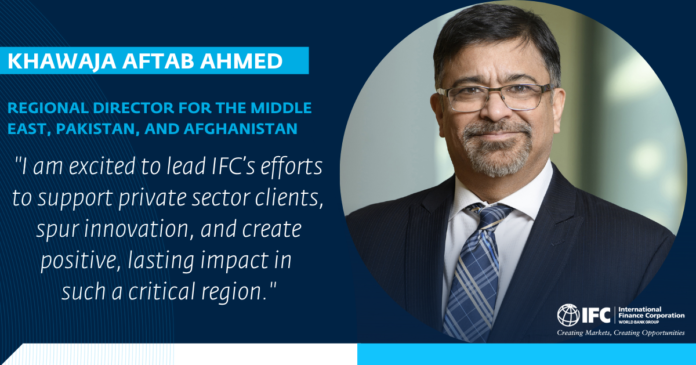International Finance Corporation (IFC) has named Khawaja Aftab Ahmed as the Regional Director for the Middle East, Pakistan, and Afghanistan. Ahmed will lead the institution’s efforts to help increase private sector participation in the economy to create jobs, address the climate crisis, close the infrastructure gap, foster financial inclusion, and support fragile and conflict-affected situations.
“I am excited to work closely with Aftab to build up IFC’s operations and impact in this very important, diverse, and promising region,” said Hela Cheikhrouhou, IFC’s Regional Vice President for the Middle East, Central Asia, Turkey, Afghanistan, and Pakistan. “His in-depth knowledge of the region, combined with his expertise across different sectors and products, will be a tremendous asset as IFC ramps up its business in the Middle East, Pakistan and Afghanistan.”
Ahmed, a Pakistani national, has 33 years of development banking experience. At IFC, he has held several managerial positions, most recently serving as Global Director of Investment and Credit Risk. Before that, he led IFC’s work with financial institutions and private equity funds in the Middle East, North Africa, and Europe, where he managed a $6 billion portfolio spread across 45 countries. He has deep experience in frontier markets, where he helped to promote innovative financial instruments and Islamic financing tools.
Ahmed holds a Bachelor of Mechanical Engineering from Pakistan’s NED University of Engineering and Technology and an MBA in Finance from the Institute of Business Administration in Karachi.
He steps into a region whose economy is still recovering from the effects of COVID-19. In the Middle East, the economy grew by an estimated 3.1 percent in 2021 after contracting 3.6 percent in 2020. Pakistan’s economy has also been affected by the pandemic while political instability has pushed Afghanistan into an economic and humanitarian crisis. As regional director, Ahmed’s priorities will include supporting private sector development in fragile and conflict-affected situations, helping countries counter and adapt to climate change, and creating economic opportunities for women, youth, and other underserved groups.
“The public sector can no longer be the main provider of jobs in the region, especially today, given the deep fiscal constraints facing most governments in the wake of COVID-19,” said Ahmed. “I am excited to lead IFC’s efforts to support private sector clients, spur innovation, and create positive, lasting impact in such a critical region.”
In the Middle East, Afghanistan, and Pakistan, IFC supports the growth of the private sector through a combination of investments and advisory services. That work is helping to create jobs, improve essential services, like power delivery, and foster financial inclusion. IFC’s portfolio in the region is valued at $3.4 billion and is spread across 139 companies in the Middle East, Afghanistan, Pakistan.




